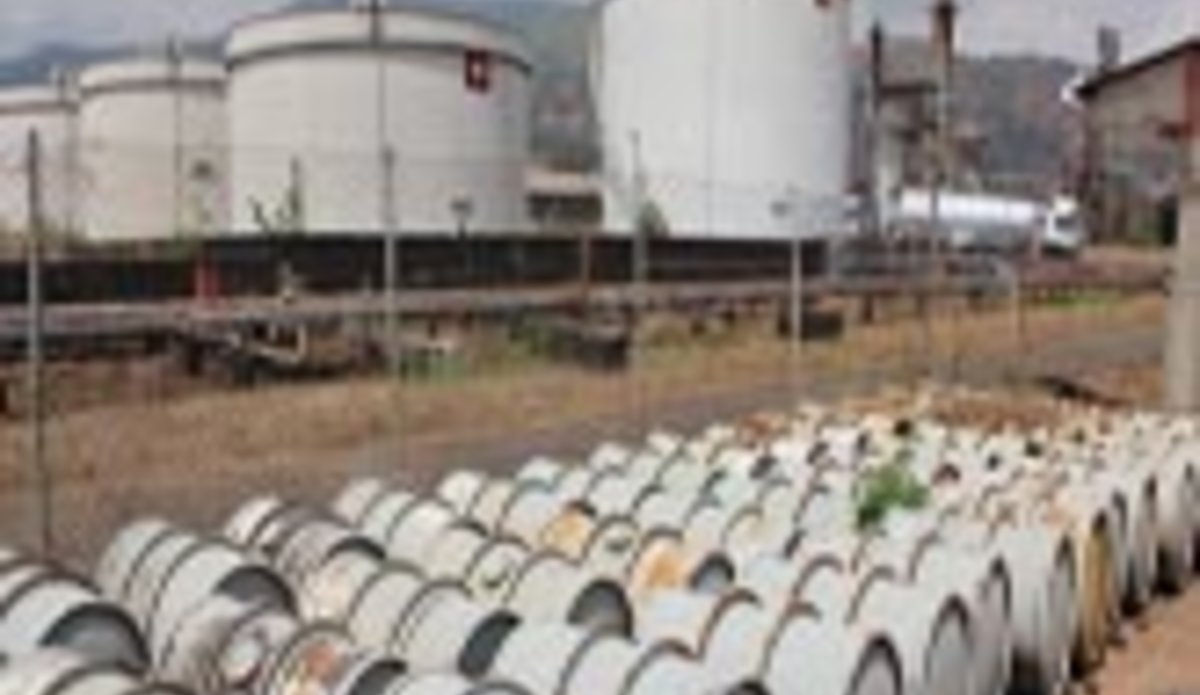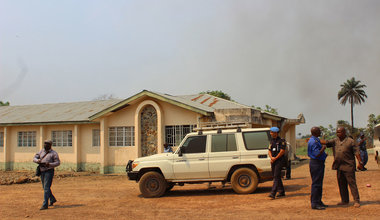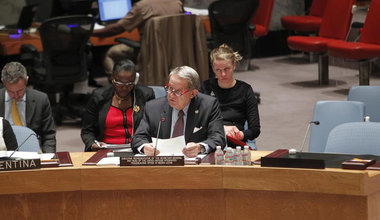UNEP Supports Clean-up of Toxic Waste Dump in Sierra Leone
Nairobi/Freetown (Sierra Leone) 27 June 2011 - An environmental and public health hazard for the residents of Sierra Leone's capital, Freetown, has been contained following the successful removal of 93 barrels of toxic waste from a former oil refinery site on the city's outskirts. With technical assistance and funding from the United Nations Environment Programme (UNEP), the Environment Protection Agency of Sierra Leone (EPA-SL) has supervised the clean-up of almost 12,000 litres, or 19 metric tonnes, of the dangerous and highly toxic substance, tetra-ethyl lead (TEL). The site is now free of harmful liquid lead.
TEL is a flammable, toxic and explosive liquid that was commonly used as a fuel booster in gasoline (petrol) to make leaded fuel. The use of the additive in fuel was discontinued around the world because of its highly toxic nature and damaging effect on catalytic converters.
The barrels of TEL were discovered in five separate locations on the refinery site, one above and four below ground. Following a request from the Government of Sierra Leone, UNEP conducted a preliminary environmental assessment and remediation planning , which determined that the significant quantities of TEL at the Kissy refinery, posed a serious risk to the health, livelihoods and security of nearby communities. TEL can be fatally toxic if ingested, is carcinogenic and can cause harm to unborn children.
In the course of the clean-up of the barrels, completed last week by a U.K.-based private contractor INNOSPEC, staff of the EPA-SL also received capacity building training in techniques for extracting highly toxic substances and in the safe storage and containment of chemicals.
The Executive Chairperson of the national Environmental Protection Agency (EPA-SL), Haddijatou Jallow, underlined the importance of building capacity and knowledge around the effective management of toxic chemicals in Sierra Leone. "The indiscriminate use and disposal of chemicals does not only have an adverse effect on the environment, but often has a devastating, irreversible and fatal impact on the lives and health of our people" she said. "Stricter controls on the use and safe disposal of all chemicals is imperative" added Ms. Jallow.
The remediation operation, which cost UNEP some US Dollars 50,000, was driven by the EPA-SL, a key partner and beneficiary of UNEP's expertise in a joint technical assistance programme known as Programme 21: Environmental Cooperation for Peacebuilding in Sierra Leone.
Kissy, where the oil refinery is located, is a densely populated neighbourhood in the east of the Sierra Leoneon capital, Freetown. The refinery site is a de facto community market garden where vegetables, fruits and staple crops are grown by local residents.
The TEL drums were brought to the Kissy refinery before the civil war in Sierra Leone started in 1991. The refinery was heavily damaged during the conflict. Sierra Leone currently has no facilities to refine crude oil and imports all necessary oil-derived products.
The liquid TEL recovered from the site is being transported to the United Kingdom for further treatment, while the drums and recovered sludges are being decontaminated to mitigate the potential risks and hazards for the local population.
The EPA-SL, INNOSPEC and UNEP have cooperated to make the site as safe as possible, and samples have been taken to assess the extent of contamination in the surrounding soil. A second phase of the operation may also be required which would involve addressing any areas on the Kissy refinery that are found with potentially harmful levels of lead. "UNEP, is a valuable and dependable partner, without their timely intervention, this exercise would simple not have been possible", said EPA-SL Chairperson Haddijatou Jallow.
Following its technical report, Sierra Leone: Environment, Conflict and Peacebuilding Assessment, UNEP, since 2010, has been working together with the Food and Agriculture Organization (FAO) and the UN Development Programme (UNDP) to provide capacity-building assistance and technical support for natural resource management in the West-African nation of Sierra Leone, within the framework of the UN's Joint Vision for Sierra Leone.
Contacts:
Mr Nick Nuttall, UNEP Spokesperson, nick.nuttal@unep.org
Professor Abdouraman Bary, Regional MEA Coordinator (Chemicals), abdouraman.bary@unep.org
Mr Oli Brown, UN Environmental Affairs Officer, oli.brown@unep.org
UNEP Newsdesk, unepnewsdesk@unep.org
 UN
UN





